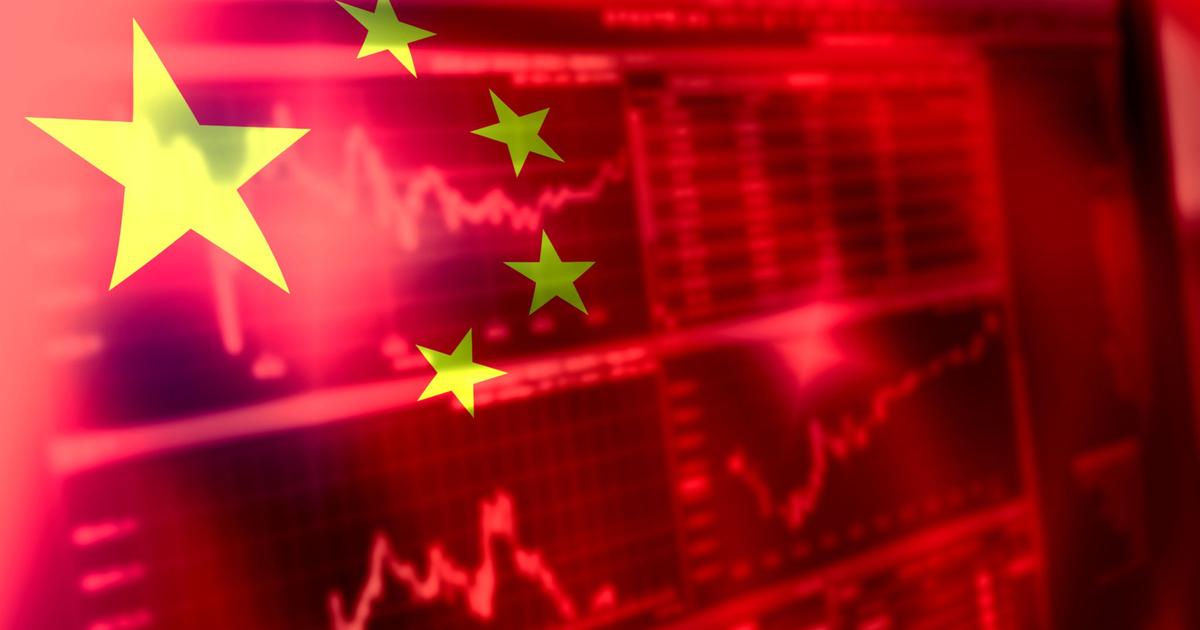Passers-by in front of a
stock exchange board
in Hong Kong:
Chinese stocks recently performed significantly weaker than the indices in Europe and the USA
Photo: BOBBY YIP / REUTERS
The picture on the world's stock exchanges is currently divided into two parts: important trading centers in Europe and the USA are rushing from record to record - but some stock exchanges in Asia are lagging behind. Especially in China, the second largest economy in the world and actually long past the Corona crisis, the stock market has shown a noticeable underperformance in an international comparison in recent months. It is true that the Shanghai stock exchange achieved an increase of almost 10 percent over the next twelve months. In Hong Kong, however, prices have been falling for months, and price gains already achieved have been completely consumed within a year.
For comparison: the neighboring Japanese Nikkei index shows an increase of almost 20 percent over a twelve-month period. With the local DAX it is even significantly more than 20 percent, so that the mark of 16,000 points could recently be exceeded for the first time. And Wall Street is listed - as measured by the broad S&P 500 stock index - with a plus of around 30 percent, also at a record level.
Financial market experts are by no means surprised by the weak share price development in the People's Republic of the past few months. "China is the first economy to get into the Corona crisis," says Joachim Schallmayer, Head of Capital Markets and Strategy at DekaBank. "It is also the first to find its way back on the growth path." However, the strong catching-up movement is now subsiding and the overall economic dynamism is weakening, said Schallmayer. "This is not a cause for concern, but a completely natural normalization process. This process is currently leading to a certain degree of uncertainty among investors, especially due to the recent corona outbreaks."
According to the expert, the main reason for the strong underperformance of Chinese stocks in an international comparison is the
regulatory interventions
that the Chinese government has carried out in various corporate sectors in recent months. "The list of industries and companies affected by this has expanded continuously over the past few weeks," says Schallmayer. "Companies that are active in the fields of technology, consumption and finance were hit particularly hard. IPOs had to be canceled, acquisitions and corporate transactions could not be carried out as planned, business models had to be restricted under penalty of punishment."
The problem: The measures taken by Chinese regulators have not only caused the share prices of the companies directly affected, especially from the tech sector, to collapse, in some cases very significantly.
The share of the online retail giant Alibaba, for example, has been around 20 percent in the red just over the past three months.
In the case of the Internet company Tencent, the price losses are even around 25 percent in the same period.
At least so far, the pressure from Beijing has not yet affected Tencent's business, as the business figures that the technology group published this week show.
Accordingly, Tencent was able to increase profits significantly despite the increasing regulatory pressure.
Regulation: Beijing means business
Investors are still unsettled - and not only with regard to companies like Alibaba or Tencent, which are directly in the sights of Beijing. Rather, investors in companies indirectly affected or not yet affected at all have become more insecure, said Schallmayer. "Accordingly, investors have withdrawn from the market or have reduced their exposure to China," he says.
This is hardly surprising, because in addition to the tech industry, China's regulators have also targeted other branches of the economy in recent months. One example is companies that offer educational services, another is companies in the real estate sector. It is becoming increasingly evident that Beijing is systematically introducing stricter rules and controls for corporations that have grown rapidly in recent years. According to the fund company DWS, a recent communiqué by the Communist Party, which refers to a period up to 2025, shows how serious the government is about this. Accordingly, the country's authorities are actively working on laws in the areas of national security, technology and monopoly. Furthermore, the laws in a number of sectors such as food, health, technology,Finances and insurance tightened. And, according to DWS in a recent publication: In the paper, companies are encouraged to resolve the regulatory issues raised on their own as they would otherwise face severe penalties.
The DWS, however, sees Beijing's interventions in the economy by no means exclusively negative, after all the regulators in the Far East are only partially doing what has been demanded in vain for leading western tech companies for years. "While the dominant position (and the low tax contribution) of the technology giants has been denounced in the West for years, but not really addressed, China has now acted," said the Deutsche Bank subsidiary in its market assessment. One of Beijing's challenges will be not to suppress the dynamism of the private sector completely, but at the same time to set limits.
Investors interested in investing in China can therefore ask themselves when the wave of regulation will ebb again - then the pressure on the stock markets should also ease.
In any case, according to DWS, the wave has not yet reached its peak.
"In our opinion, the initiatives, and thus the uncertainty for the corporate sector, could continue into 2022," said the fund company.
Weaker growth and a comeback of the corona crisis
This also fits in with a report in the "Financial Times" from last week, according to which China state and party leadership has again announced additional interventions and wants to target high earners and the super-rich in particular.
In addition, the measures to intensify supervision and control of Chinese companies are an important, but by no means the only reason for the recent weak development of Chinese stocks.
There are also various other factors, such as:
Monetary policy:
The Chinese monetary policy, which was very expansive during the pandemic and supported the markets, is now somewhat more cautious, explains DekaBank expert Schallmayer.
In this respect, money supply growth in China has weakened significantly.
"This is quite understandable. A monetary policy that is too loose could endanger financial market stability," says Schallmayer.
Economic growth:
Because China got out of the Corona crisis earlier, the comeback thrust there is already subsiding - while it is having an even stronger effect in Europe or the USA. According to DWS, for example, the consensus estimates for the 2021 growth in gross domestic product (GDP) in the USA have increased from 3.9 to 6.5 percent since the beginning of the year. In China, on the other hand, the estimate has only risen from 8.2 to 8.5 percent. And for 2022, the growth estimates are only 140 basis points apart, according to the DWS. Last week in particular, data from the Chinese retail sector showed that the upswing there is apparently losing pace - the stock exchanges in Hong Kong and Shanghai reacted immediately with price losses.
The corona pandemic:
China had already ticked off the corona crisis - but now the pandemic has flared up again and again in the People's Republic.
This also disrupts economic development and unsettles investors.
For the export-strong Chinese economy, for example, particularly painful: important container transshipment points have repeatedly had to be temporarily shut down due to local corona outbreaks.
As a result, supply chains come to a standstill - an additional problem in the already heavily overloaded global logistics.
Enlarge image
Optimistic China investor:
GAM fund manager
Jian Shi Cortesi
What does all this mean for equity investors?
Jian Shi Cortesi
, fund manager for Asian stocks at investment company GAM, is optimistic: "Asian stocks are being supported by the global economic recovery and ample liquidity in the market," she says. "However, compared to US stocks, Asian stocks continue to trade at a significant discount in terms of price-to-earnings, price-to-sales and price-to-book ratios."
With regard to China, the fund manager is also positive: "In China, the economy has fully recovered and the vaccination process is progressing rapidly, which should stimulate economic growth for the rest of the year," she says.
"All of these factors should result in strong corporate earnings growth and positive stock prices by year-end."
On the other hand, the assessment of the DWS sounds much more cautious: Regulation will advance and the skepticism of foreign investors could still increase, writes the fund company.
"Individual segments may be oversold here in the short term, but as long as the regulatory uncertainty remains, the upward movements could remain limited."
In short: caution is still appropriate for the time being.
cr







/cloudfront-eu-central-1.images.arcpublishing.com/prisa/EEJSWJ3MT5C2LL4U4EDDVAF3FY.jpg)






